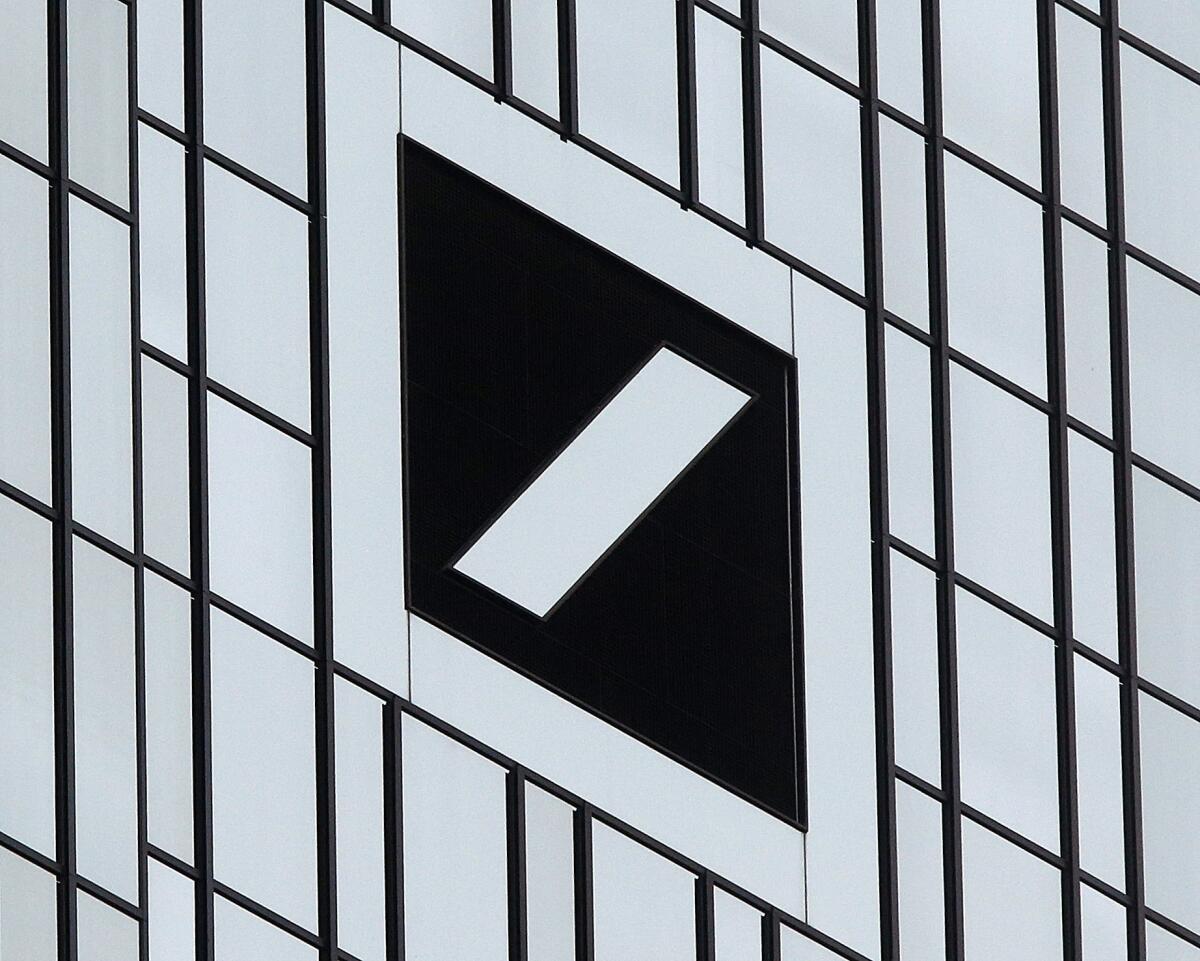Deutsche Bank shares tank as concern grows over its stability

Worries over the financial stability of Deutsche Bank returned to the fore Friday, sending shares in Germany’s biggest bank to a record low and rekindling broader concerns about Europe’s financial sector.
Reports that hedge funds are moving their business out of the bank were the catalyst to the latest sell-off. At one moment in frenzied early trading, the bank’s stock fell an additional 8% to below 10 euros a share for the first time, before recovering somewhat to trade 1.20% lower at 10.75 euros.
Deutsche Bank has been a growing concern for investors since U.S. authorities two weeks ago said they are seeking $14 billion from the bank to settle legal claims over its sales of mortgage securities, complex investments that were one of the key causes of the global financial crisis in 2008.
With the German government giving no sign it would be prepared to offer a bailout, and the bank heavily exposed to risky investments, notably in the derivatives markets, investors have grown increasingly jittery. That worry was relieved only temporarily by Deutsche Bank’s move this week to sell an insurance subsidiary for just over 1 billion euros ($1.12 billion) to shore up its capital buffers.
The latest unease over Deutsche Bank stemmed from reports that about 10 hedge funds had taken measures to reduce their exposure to the bank.
The turmoil prompted Deutsche Bank CEO John Cryan to issue an open letter to employees in which he says the news about the hedge funds is “causing unjustified concerns” and should be seen in the wider context of the bank’s 20 million clients.
“It is our task now to prevent distorted perception from further interrupting our daily business. Trust is the foundation of banking. Some forces in the markets are currently trying to damage this trust.”
The bank, he insisted, is fundamentally strong, is meeting its capital requirements, is profitable and has “an extremely comfortable buffer” when it comes to liquidity, with reserves of more than 215 billion euros ($241 billion).
“There is therefore no basis for this speculation,” Cryan said. “Nor can uncertainty about the outcome of our litigation cases in the U.S. explain this pressure on our stock price, if we take the settlements of our peers as a benchmark.” U.S. bank Goldman Sachs, for example, paid a $5 billion settlement in a similar U.S. investigation.
At the ground level, the bank’s customers seemed unfazed.
“Deutsche Bank remains Deutsche Bank — it’s a big bank in the world and in Germany,” said Berlin property developer Harry van Caem at a downtown branch. “I think the government will not abandon them, it always had a good name and there will be a solution.”
Analysts, however, said it’s difficult for a bank to turn around its fortunes once it has been tainted by speculation of financial trouble.
“In banking, perception is everything, and in times of stress investors tend to shoot first and ask questions later and when confidence starts to leak away the ensuing drip can very quickly turn into a waterfall ,” said Michael Hewson, chief market analyst at CMC Markets.
The wider worry, which has sent stock markets across Europe sharply lower on Friday, is that Deutsche Bank may prove to be a “Lehman moment” for the European banking sector. In September 2008, the U.S. government made clear that it was not going to bail out investment bank Lehman Bros. when it was in huge difficulty. Because Lehman was connected to many other banks, the decision to let it fall proved fateful: It triggered a collapse of confidence in the global financial system that pushed the world economy into its deepest recession since World War II.
“German Chancellor Angela Merkel says there will be no state bailout, but this might be a case of `famous last words’, as the history of banking crises often shows that major banks cannot be allowed to fail for fear of systemic risk affecting the financial system and negatively impacting the real economy,” said Neil MacKinnon, global macro strategist at VTB Capital.
That’s why many experts expect some sort of deal to help the bank, should it be needed. That may see bondholders take a hit or a possible merger of the bank with Commerzbank, which has its own financial problems.
The German government is also expected to pressure U.S. authorities to reduce the fine, as it would be in no one’s interest for one of the world’s most systemically important banks to go under.
One major difference from 2008 is that the European Central Bank has a range of tools to shore up liquidity in banks under its jurisdiction, the 19 countries that use the euro. As a result, Deutsche Bank should be able to avoid a funding squeeze and a potential run on deposits.
MacKinnon says that’s not enough, though, and that the European banking sector is likely to remain under stress given the absence of much-needed efforts to restructure and raise money.
Shares in banks across the region were under pressure. Commerzbank was down 6%, Italy’s UniCredit 4.4% and Spain-based Banco Santander 3.7%.
“It is insufficient just for the central bank to provide unlimited liquidity,” he said. “As a result, investors need to be mindful of the potential for a market upset in the near term.”
If Friday’s stock market response is any indication, investors are heeding that advice.






